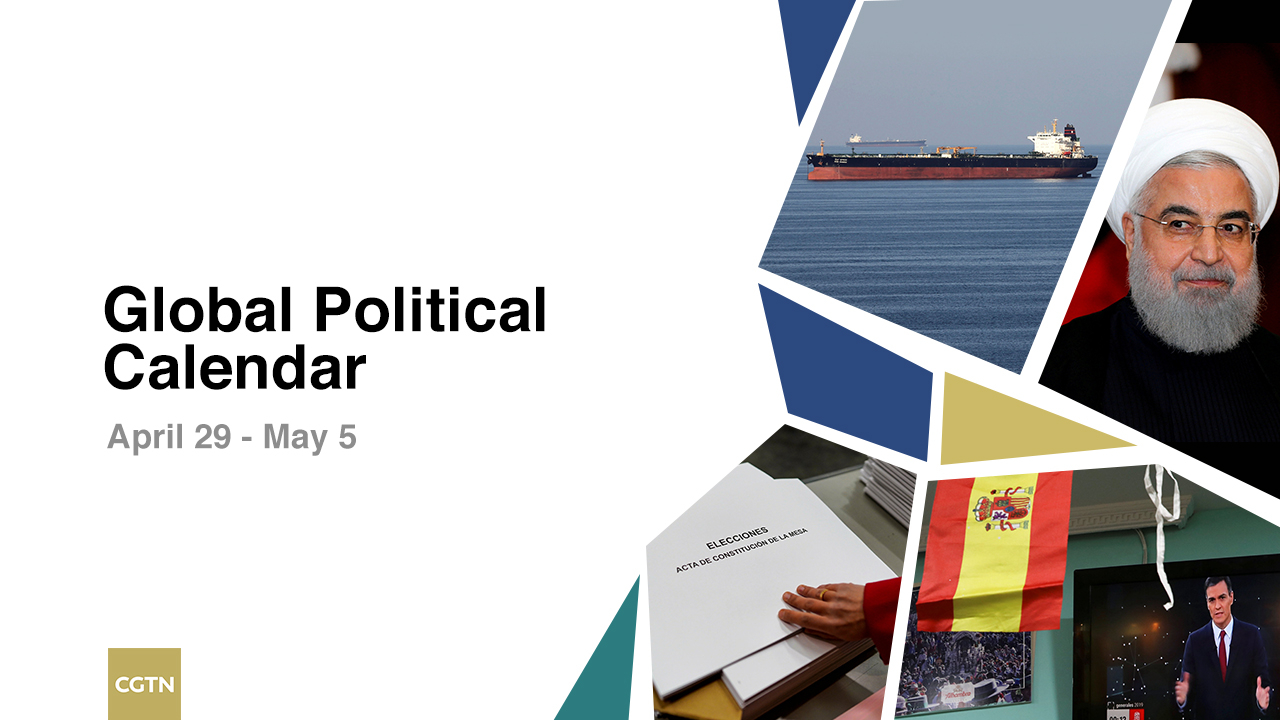
World
16:55, 28-Apr-2019
Global Political Calendar: An uncertain future for Iranian oil
By John Goodrich

Waivers on U.S. sanctions against Iran expire, elections in Spain could herald lengthy negotiations and campaigning for EU polls intensifies.
Iran, oil, sanctions
The United States announced last Monday that it would not extend waivers on Iran sanctions, due to expire on Thursday, in a move that could have wide-ranging global consequences.
The U.S. granted six-month waivers to major economies including China, Japan, South Korea, India and Turkey, allowing them to continue importing oil from Iran without sanction, after President Donald Trump pulled out of the Joint Comprehensive Plan of Action nuclear deal in 2018.
The decision not to extend the waivers is "intended to bring oil exports of Iran to zero," according to a White House statement.
It led to a further jump in the global oil price on the expectation of reduced supply, with OPEC already planning cuts and production and export issues in Libya and Venezuela, and is likely to hit an Iranian economy for which oil is a major source of revenue.
How Tehran reacts, the response of oil importers, any swing in the global oil price and the consequences for the Iran nuclear deal will be closely watched.
What next for Spain?
Spain votes in its third general election in four years on Sunday, but with no party expected to win a majority the coming days are likely to mark the beginning of a long process of coalition talks – or even lead to another election.
Socialist Prime Minister Pedro Sanchez called early elections after his government failed to get its budget passed in February, and polls suggest his party could again be the biggest – but it would likely need to agree on a deal with other parties to form a government.
A conservative coalition is also possible, especially given the rise of newcomer Vox, one of a number of right-wing populist parties in Europe expected to pick up votes in the upcoming EU elections.
The role of right-wing parties will likely be on the agenda when Italian Deputy Prime Minister Matteo Salvini and Hungarian Prime Minister Viktor Orban hold talks on Thursday as campaigning for the European Parliament polls is stepped up.
And elsewhere in Europe, Britain will vote in local elections expected to be damaging for Prime Minister Theresa May, who is considering putting her Brexit deal to MPs for a fourth time this week.
Day-by-day
Monday: Voting begins in phase four of India's lower house election, Japanese PM Shinzo Abe visits Canada, German Chancellor Angela Merkel and French President Emmanuel Macron host the leaders of Balkan countries in Berlin, and Liberal PM Scott Morrison and Labor leader Bill Shorten debate ahead of Australia's general election.
Tuesday: Japanese Emperor Akihito abdicates, Myanmar's State Counselor Aung San Suu Kyi visits Cambodia, German Chancellor Angela Merkel hosts Iraqi PM Adel Abdul-Mahdi, and U.S. President Donald Trump holds infrastructure talks with top Democrats.
Wednesday: Crown Prince Naruhito is enthroned as Japan's new emperor, U.S. Attorney General Bill Barr is grilled by the Senate Judiciary Committee on the Mueller report, and German Chancellor Angela Merkel begins a trip to Burkina Faso, Mali and Niger.
Thursday: U.S. waivers on Iran sanctions are due to end, Italian DPM Matteo Salvini meets Hungarian PM Viktor Orban in Budapest, the G5 Sahel alliance holds a summit in Burkina Faso, discussions to implement a peace accord in South Sudan take place in Ethiopia, and Britain votes in local elections.
Friday: European Council President Donald Tusk marks Poland's Constitution Day with a lecture at Warsaw University, and Slovak PM Peter Pellegrini meets U.S. President Donald Trump in Washington.
Saturday: China marks the centenary of the May Fourth movement, and a coronation ceremony is held for Thai King Maha Vajiralongkorn.
Sunday: Round two of North Macedonia's presidential election takes place, and Panama votes in presidential and National Assembly polls.

SITEMAP
Copyright © 2018 CGTN. Beijing ICP prepared NO.16065310-3
Copyright © 2018 CGTN. Beijing ICP prepared NO.16065310-3